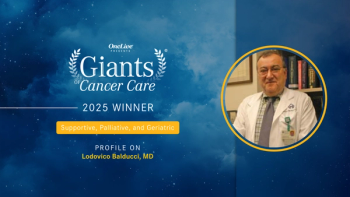
Choosing Post-Progression Therapy for Metastatic RCC
Transcript:Robert A. Figlin, MD: Toni, the million-dollar question is a patient comes to you, they’ve gotten therapy in the community or at my center, and they happen to be in Boston. When do you decide? What are the criteria that you use? And then, when you have those criteria, how do you share it with the patient? How do you individualize the time between what we now call first-line and next-line therapy? What goes through your mind? What’s the conversation like? And what’s the decision tree?
Toni K. Choueiri, MD: Despite the millions of things that we have to do in clinic, I learn more and more that talking to the patient is very, very important. How did the patient feel on the first-line? When they are seeing me, are they okay or not? What were the side effects that were expected from this first-line, assuming it’s a VEGF tyrosine kinase inhibitor? And we look at the scan ourselves, as do our radiologists, and we look at them carefully. As Michael was saying, we don’t want to miss a situation where there’s a minimal growth that is interpreted on the radiology report, and the radiology report varies. Some of them are very large. Others just have the impression, and we have to look at them carefully. There have been cases where a patient does have a progression, but a patient who has been on a VEGF TKI for 2 years—and yes, all the disease is stable, but there’s a significant progression in 1 site—the patient may get radiation, or may get surgery, and continue on the same TKI. And there are anecdotal data to support that. So, having a very, very important first encounter that gets all the story together is important to decide on this next step. And if it’s real progression, then the next step is switching treatment after, of course, counseling them.
Robert A. Figlin, MD: Absolutely. I think what we’ve learned is, in just the last few minutes, that there are some patients who we can observe, which is different than a decade ago. There are some patients that are RECIST progressing who we can continue on similar therapies. There are some patients where we can dose modify schedules and agents in a way that allow them to continue. We, as of yet, don’t have a circulating biomarker to help us with that decision making, and we see many patients who may have had their therapies prematurely stopped and who went on to a second-line treatment when they may have still been able to benefit with some modulation from the first-line therapy.
So, Michael, that leads us to you. We’ve considered all of those subtleties. We’ve been good doctors. Despite having considered active surveillance and imaging, and circulating cells, we, and the patient, believe that it’s time for a switch. Rather than call it “second-line therapy,” I think we’re moving away to calling it “next line of therapy.” And I think that’s because even though the trials have been structured in a very traditional pivotal trial approach, which is what would be second-line after first-line, the reality is we have many choices now. Let’s talk about some of those choices. Give me your decision tree when thinking about next line of therapy and the use of axitinib, a checkpoint inhibitor like nivolumab, cabozantinib, and lenvatinib/everolimus. All of these are currently approved in a similar setting of patients, which is post-progression in frontline therapy. So, start to walk us through that decision.
Michael R. Harrison, MD: Like David said, when I start down my decision tree for subsequent line of therapy, one of the first things I’m doing is looking at the patient, talking to the patient, and understanding what symptoms they might have related to their disease. I’m also looking at the radiology report and understanding where their sites of disease are, trying to correlate those with symptoms. We also understand that certain sites of disease may be different, certainly bone and liver versus lung. When I’m thinking of a subsequent line of therapy, if I’m thinking of a patient who was failed by a first-line VEGF receptor TKI, I’m really choosing between cabozantinib or nivolumab. And what’s going to guide me, again, is probably the symptoms and thinking about if that patient needs a delay in progression, or what we measure in trials is a progression-free survival advantage.
If a patient is symptomatic, especially those patients that have sites of disease in the bone or the liver, I’m thinking a little bit more about cabozantinib. If not, an example would be a patient who has clear progression. But maybe it’s just in the lung or maybe in other sites like lymph nodes. Then I’m probably thinking more about nivolumab. Another factor that I’m using to guide me is thinking about their quality of life, certainly how long they were on first-line therapy. I’m assuming the common patient with a VEGF receptor TKI in first-line therapy, how long they were on therapy and what symptoms they have with that or side effects from that therapy. That’s going to maybe guide me. So, do they need a break from the VEGF receptor TKI profile? Maybe that’s going to push me towards nivolumab. Did they do really well and not have a lot of side effects on a VEGF receptor TKI? I might lean towards cabozantinib.
As far as using whichever one of those drugs I’m using, I’m probably going to use the other one next in most cases. So, it’s probably going to probably look like cabozantinib/nivolumab, nivolumab/cabozantinib with some exceptions. And then, with those other drugs listed—axitinib, lenvatinib, everolimus—I’m primarily reserving those for fourth-line therapy and beyond in most patients.
Transcript Edited for Clarity



































